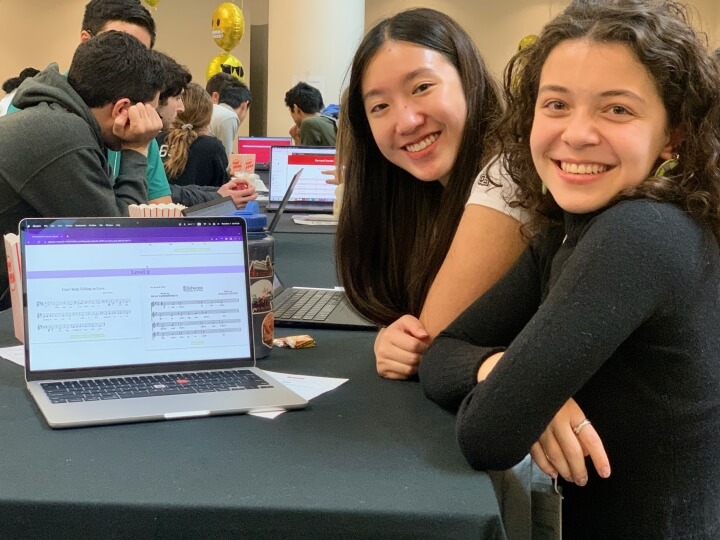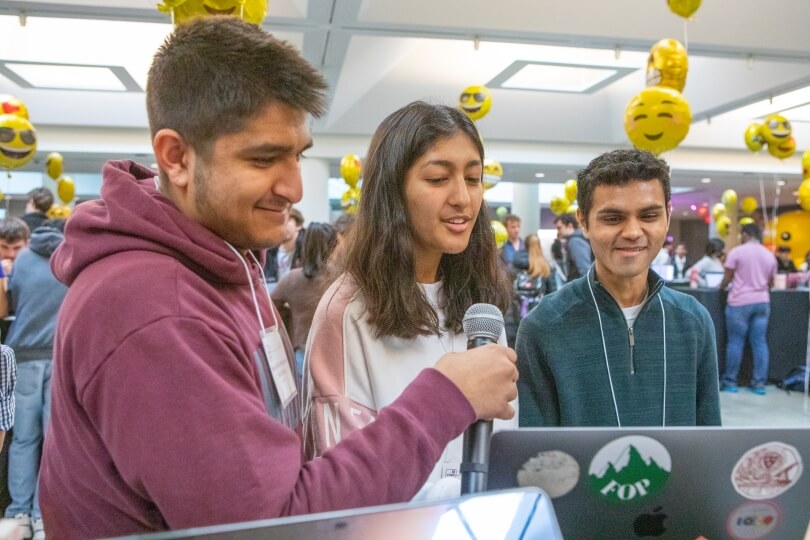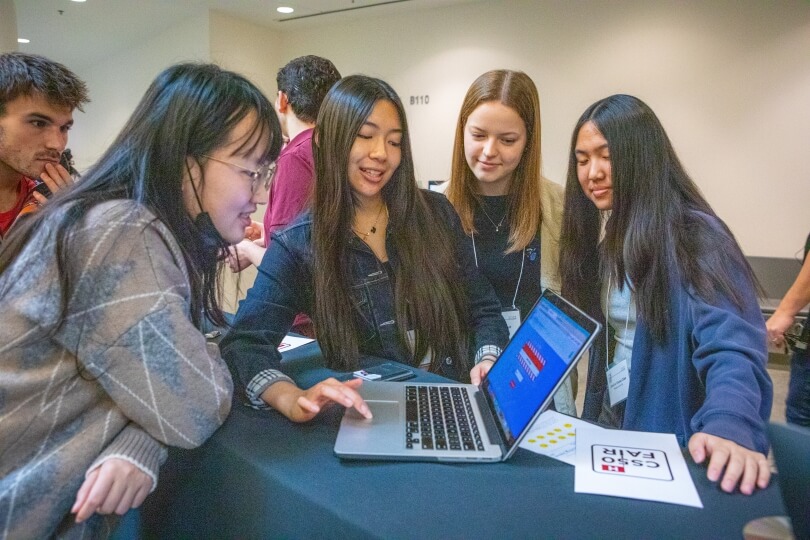News
Karly Chan and Andreea Haidau with their "PITCHPERFECT Music Library" project at the CS50 Fair at the Northwest Science Building. (Matt Goisman/SEAS)
First-year student Andreea Haidau arrived at Harvard with no prior experience in computer science or coding. That didn’t stop her from enrolling in “CS50: Introduction to Computer Science” at the Harvard John A. Paulson School of Engineering and Applied Sciences (SEAS) in her first semester.
Haidau and partners Karly Chan and Emily Chan recently displayed their final project at the annual CS50 Fair at the Harvard Northwest Science Building in Cambridge. They both sing in the Radcliffe Pitches a cappella group, so they programmed the PITCHPERFECT Music Library, a website in which a singer can sing into their device’s built-in microphone, then the program detects the frequency and displays the note being sung. This allows a singer to match vocal pitch to sheet music, which can be uploaded to the site.
Despite the challenge of learning an entirely new subject, Haidau came away from the semester with a newfound appreciation and interest in computer science.
“I’m now considering a secondary in CS just because this class exposed me to the satisfaction of coding,” she said. “It was quite intensive, but I’m glad I had the opportunity. A lot of courses boast that they create a community within their classroom and curriculum, but I think CS50 does that really well.”
This was the 13th CS50 Fair, but the first to take place in person since 2019. Students packed the lower level of the Northwest Science Building, walking from laptop to laptop to check out the wide range of final projects. Music playing over loudspeakers and a teaching fellow in a duck costume handing out stress balls made the event feel like a celebration – something that couldn’t be replicated when pandemic restrictions prevented large gatherings.
“It’s been so nice to see so many people gathering, certainly, and demonstrating what they accomplished this semester,” said David Malan, course instructor and Gordon McKay Professor of the Practice of Computer Science at SEAS. “Even though the course and school year went well educationally during the pandemic, all things considered, it just wasn’t the same experientially. You certainly don’t get to know the students as well until you’re actually seeing them at in-person lectures or lunches, and now showing their projects.”
Reza Shamji, left, presents his website "PalPursuit" at the CS50 Fair at the Northwest Science Building. (Eliza Grinnell/SEAS)
Neither Haidau nor Chan plan to concentrate in computer science, reflecting the unique role CS50 plays at Harvard. A great experience in the course may inspire a student to become a computer scientist, but it just as easily could be a one-off exploration of a new subject or a way to augment skills gained in other engineering disciplines.
“I’d like to think we’ve not only helped new students who want to major in computer science prepare for those future studies, but also opened other students’ eyes to a field that they didn’t realize existed or was accessible to them,” Malan said. “Half of CS50 students go on and take other computer science classes, but half do not. So we aim to provide students not only with a conceptual framework via which to solve problems but also practical skills that they can apply to problems in the arts, humanities, social sciences, and beyond.”
Second-year student Reza Shamji took computer science courses in high school but said CS50 took that knowledge to another level. The course began with some of the principles of coding, but by the end Shamji had learned the basics of more than five languages. He combined some of them into PalPursuit, which connects users with potential new friends based on a range of characteristics.
“It’s easily one of the best courses I’ve taken in my life,” said Shamji, who declared in electrical engineering this fall. “The lectures were logical, given in a way that we’d understand, and entertaining. I didn’t expect to actually learn the depth of all of the languages we discussed, but I did.”
The "Have Yourself a Merry Little Christmas Party" team of Eliana Bonbrest, Crystal Manyloun and Jessica Diao at the CS50 Fair at the Northwest Science Building. (Eliza Grinnell/SEAS)
Eliana Bonbrest is another first-year student who had no prior coding experience before taking CS50. Bonbrest and teammates Jessica Diao and Crystal Manyloun programmed “Have Yourself a Merry Little Christmas Party,” a party planning site that includes to-do and guest lists, a recipe database and menu planner, a secret Santa generator, and a music library.
“We chose this as our project because we thought it would be both useful and a joy to create,” said Bonbrest. “Looking forward to the holiday season, being able to tap into that joy made us look forward to coding this website. It also allowed us to tap into our own interests, such as music and cooking, so that each individual in our group could have a piece of themselves represented.”
Bonbrest plans to study biomedical engineering at SEAS. While it’s still too early to know how computer science will factor into her further studies, she’s confident the coding abilities she acquired will be a benefit.
“While it was certainly challenging, now that I am able to look at what I accomplished I am very proud and thankful for my newfound programming skills,” she said. “I am thoroughly convinced that this class has taught me to think in a new way, one that will be invaluable to my future pursuits in engineering.”
Topics: Academics, Computer Science
Cutting-edge science delivered direct to your inbox.
Join the Harvard SEAS mailing list.
Press Contact
Matt Goisman | mgoisman@g.harvard.edu





